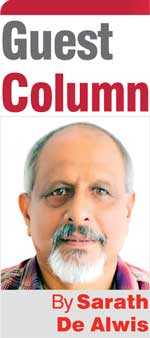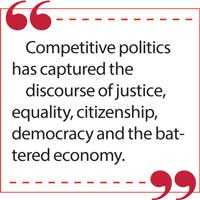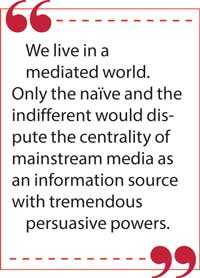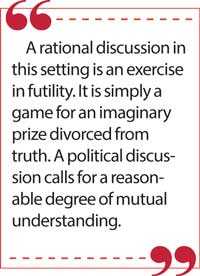Sunday Feb 15, 2026
Sunday Feb 15, 2026
Wednesday, 22 May 2019 00:00 - - {{hitsCtrl.values.hits}}
“Why is this age worse
than earlier ages?
In a stupor of grief and dread
have we not fingered the
foulest wounds
and left them unhealed by our hands?”
Russian poet- Anna Akhmatova
When confronted with a mindless mass murder in the most horrific fashion what do we do? The natural response of those who witnessed the horror from a distance as well as those who survived the event at close quarters have one essential human emotion.
We search for some meaning in the mindboggling event. In this aftermath we did not do that. Why? Because our leaders failed to do that. The President said he was not informed of the threat. The Prime Minister said that he was excluded from the inner circle in charge of national security.
In the stupor of grief following Easter Sunday, it now seems that we have not ceased to finger our foulest wounds as the Russian poet observed in her poem written a century earlier in 1919.
In the age of 24-hour-news we get news. More than news we get opinions of those who provide the news. The owners of the news disseminators have opinions. They want us to listen to their opinions.
My favourite TV feature is the daily Sinhala program titled ‘Derana Aruna’ – a lyrical rhyme of a promise which translates to ‘Our Land at Dawn’.
The presenter is a skilled artist convinced of his persuasive powers of motivation and manipulation. It is a treat to watch him explain why Mangala Samaraweera is mistaken and why our nation should be prefixed as ‘Sinhala Buddhist’.
We live in a mediated world. Only the naïve and the indifferent would dispute the centrality of mainstream media as an information source with tremendous persuasive powers.
The mistake we often make is that we think that the discerning will not succumb to the ‘intoxicating brew’ of persuasion and fantasy. The media magnates know better.
Media coverage can cover an issue that is not yet controversial by covering it ad nauseum insisting that it is necessary and in the national interest. They can turn on and off the coverage of given public discourses.
This enables them to make the inconsequential consequential and the serious in to trivial. This is the vital media lesson that was driven home in the aftermath. 
In the aftermath, we must grapple with two aspects of its consequences. First is the human aspect that contends with those who died, wounded, disfigured, and the orphaned.
The second is the civic aspect. Easter Sunday carnage has ignited cataclysmic consequences in a fractious society that is now suffocating in the toxic mixture of suspicion and primordial tribalism.
Competitive politics has captured the discourse of justice, equality, citizenship, democracy and the battered economy.
This civic aspect is made more complex by a not very pleasant discussion on the ‘Sinhala Buddhist’ heritage of Sri Lanka and the real locus of national power.
When a country emerges from a terrible war, the manner and the spirit and the élan in which its people decide to confront the legacy of death and suffering plays a crucial and an integral part in the construction of its post war national image.
When we ended the 26 years of war against separatist terrorists, we invited tourists to come to a triumphant land that defeated the most viscous terrorists in all human history. Therein lies a tale. After the watershed year 2009, the Rajapaksa family under whose leadership and benign watch we won the war had the rare genius to introduce perception-driven politics in place of objective politics. 
Since then we are perception-driven. Objective reality has given way to perceived reality. It does not matter that the million odd trishaws or ten thousand busses of the CTB cannot ply on our expressways. The superhighway is progress.
That the money and the effort could have had a more meaningful impact if invested on mass rapid transport systems in the major cities is neither here nor there. The few oligarchs have decent highways to test their Bentleys and Maserati Gran Cabrios.
Truth no longer matters. Perception is what matters. Alas! The perception engineers are all in the Rajapaksa camp.
Last week we witnessed a great example of perception engineering in a rather innocuous event that earned a lot of television coverage.
Acting Defence Minister Ruwan Wijewardene visited Minuwangoda for an on-the-spot assessment of the damage caused by rioting and to be briefed on the progress of restoring normalcy.
The television channel owned by the preeminent perception engineer of the ‘Api Wenuwen Api’ fame telecasted the event live.
The cameras zoomed on the armoured convoy racing with their sirens emitting ear-splitting wailing carrying the Acting Defence Minister. The racing convoy segment was appreciably disproportionate to the main news segment of the Minister meeting the local people.
It created the perceived reality of:
nThe Acting Defence Minister was enjoying the perks of office during his brief acting tenure, and
nThat the delightfully detached, politely reticent Acting Defence Minister was no match for the macho alternative candidate, waiting in the wings 
26 days after the event, the country awaits the findings of the committee of inquiry that the President decided to appoint no sooner he learnt of the event while still in Singapore.
Since then Nero has played the fiddle at many gatherings including distant China. Yet, we are nowhere near the truth about why we failed to heed the warnings about the attack received as early as 4 April.
In our search for a meaning, Opposition Leader Mahinda Rajapaksa has helped us to locate the elementary dynamics of our politics.
In the backdrop of this tragic events, in the hearts and minds business, Mahinda is an unqualified success. The scope and the impact of his success following the cataclysmic events has a direct and an unambiguous correlation to the failures of Ranil Wickremesinghe and Maithripala Sirisena.
When competitive politics is reduced to a simple correlation of opposition success and government failure, it is obvious that the nation is at a standstill petrified in fear of the unknown unknowns and exhausted by the known unknowns.
And now we must turn to the other conundrum in our search for a meaning.
Mangala Samaraweera’s stubborn claim of universal equality of all in a land where the majority are Sinhala Buddhists is countered by the ultraorthodox patriots who insist that Sri Lanka is a Sinhala Buddhist land where others are welcome with that proviso firmly entrenched.
Hereon, the focus of this essay is on the identity labels that have surfaced in the aftermath.
A new wrangle has erupted in the aftermath over what is righteous and what is lawful in framing national identity. This is all about nationalist thought process.
The nationalists are obsessed with the notion that they are unique. That they are above all others. Then they are griped by the fear of isolation. Nationalism is immune to reality. In other words, nationalism is power hunger wrapped in self-deception.
A rational discussion in this setting is an exercise in futility. It is simply a game for an imaginary prize divorced from truth. A political discussion calls for a reasonable degree of mutual understanding.
Here the Mahinda Rajapaksa school of political science has a proven track record. They are proving performers in the Orwellian tradition. “Facts are selected or suppressed in order to make a case; if need be, the necessary facts are simply invented or, contrariwise, erased.”It is futile to engage the Sinhala Buddhist Sangha fraternity in the politics of recognition and dignity. The brave man Mangala Samaraweera talks of universal recognition of individual rights and the core values of a liberal society that holds the promise of individual autonomy. Those who insist on the Sinhala Buddhist identity assert a collective identity – the authentic product of the alchemy of nationalism and politicised religion.
In the search of a meaning in this trauma, we find that the Rajapaksa monolith is firmly on a comeback trail. Not so much by their effort but by default of the team that we propelled to power in 2015. Bleak days are ahead.